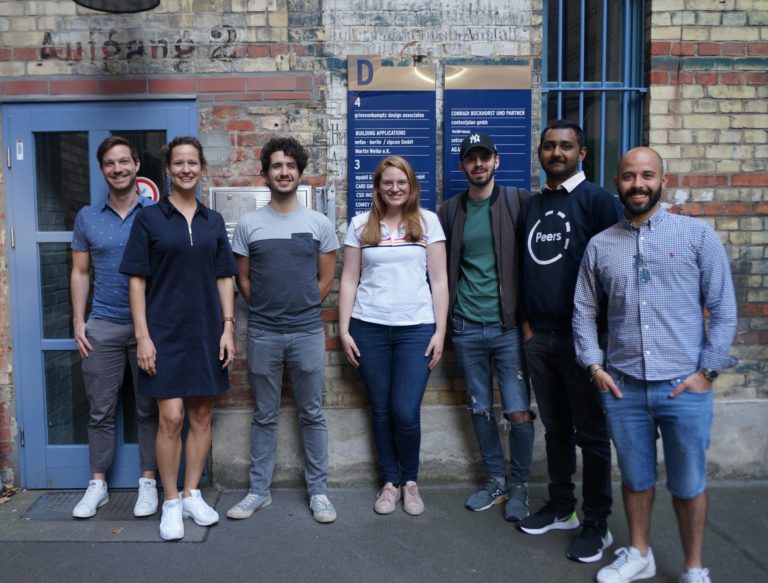Women in Tech: A new normal
Elisa Hertzler, CEO and Founder
We used to have a female frontend developer at Peers. She had to quit due to personal reasons and now we are looking for a successor. When my co-founder David updated me about the applicants funnel, he kept telling me, that „she“ will need to have 3+ years experience, probably be situated in India, she needed to be able to program such and such languages and so on. At one point, he interrupted himself, saying „it’s interesting, in my mind, our new frontend is a woman for sure“. I think the ratio of women applicants vs. men in our funnel at that point was 1:10. Quite typical for a tech position. To summarize, David’s image (and mine, too, quite frankly) was not based on logic or real-world-probability, it was based on our previous experience.
To me, that story tells quite vividly why representation matters. The story we tell ourselves about the future is how the future will be. Star Trek is a famous example of how science fiction movies drive technological innovations. Motorola’s Chief engineer Martin Cooper invented the cell phone in 1973 and stated that he got the idea from the Star Trek communicator1. Seeing a new reality apparently makes it possible to design that reality and put it into action.
Language works in similar ways. In an experiment, Harvard researcher Mahzarin Banaji gives people this riddle to solve: „A father and his son are in a car accident. The father dies at the scene and the son, badly injured, is rushed to the hospital. In the operating room, the surgeon looks at the boy and says, “I can’t operate on this boy. He is my son.“ Take a moment to figure out the answer.
The solution is this: The surgeon is the boy’s mother2. Apparently, many people struggle finding the answer. We still often times associate „professional roles“ more strongly with men than with women. The reason is that our brain gives us – often times needed, in this case overdone – shortcuts. We associate the surgeon with a man because probably we have seen more male surgeons than female ones. However, representation works in both ways. The word „Bundeskanzlerin“ (female chancellor) has been added to the Duden dictionary only in 2004, one year before Angela Merkel was elected as the first woman holding office3. Apparently beforehand, nobody thought the word was missing. Nobody thought of a female chancellor, just like nobody saw a female surgeon in the Banaji riddle.
Why is that important? Why do I spend time thinking about whether our next developer will be male or female? If fairness and equal chances are not enough on their own, take a look at the economic results of diverse teams.
Diverse teams show better results.
A famous BCG study shows a 19% increase in innovation and plus 9% EBIT4 if leadership teams are above-average diversified. Diversity goes far beyond gender, of course. It includes different ages, races, sexual orientations, religious beliefs, nationalities, social backgrounds, physical and mental abilities and more. The BCG study further states: „Diversity fosters resilience, too. With a broad array of perspectives, people can adapt to and bounce back

quickly from unexpected shocks.“4 In a start-up, we take results like this one very literally. Equipped with limited resources, you have to use all the advantages possible to get the most out of your team, in the least time possible.
At Peers today, out of 13 employees we have 8 different nationalities / ethnic backgrounds and 4 major religions. Our diversity not only leads us to better discussions, higher innovation and better results, but also as a bonus we have the greatest cooking nights and amazing holiday stories. We also represent our diverse user and customer groups. We are able to take different point of views, identify with varying opinions and understand various needs. Our mission is to drive individuals, teams and companies forward with learning and development. We start by learning and developing amongst ourselves.
Sources:
1 – How William Shatner Changed the World – Martin Cooper, mobile phone Inventor. (2009, 8. Dezember). YouTube.https://www.youtube.com/watch?app=desktop&v=wN-_VA5HFwM
2 – Banaji, M. R., & Greenwald, A. G. (2016). Blindspot: Hidden biases of good people. Bantam.
3 – Bohr, F., Duhm, L., Fokken, S. & Pieper, D. (2021). Ist das * jetzt Deutsch?. SPIEGEL, Nr. 10 / 06.03.2021, S. 12.
4 – Winning the ’20s. (2019). BCG analysis. https://www.bcg.com/de-de/featured-insights/winning-the-20s/embrace-business-imperative-of-diversity
